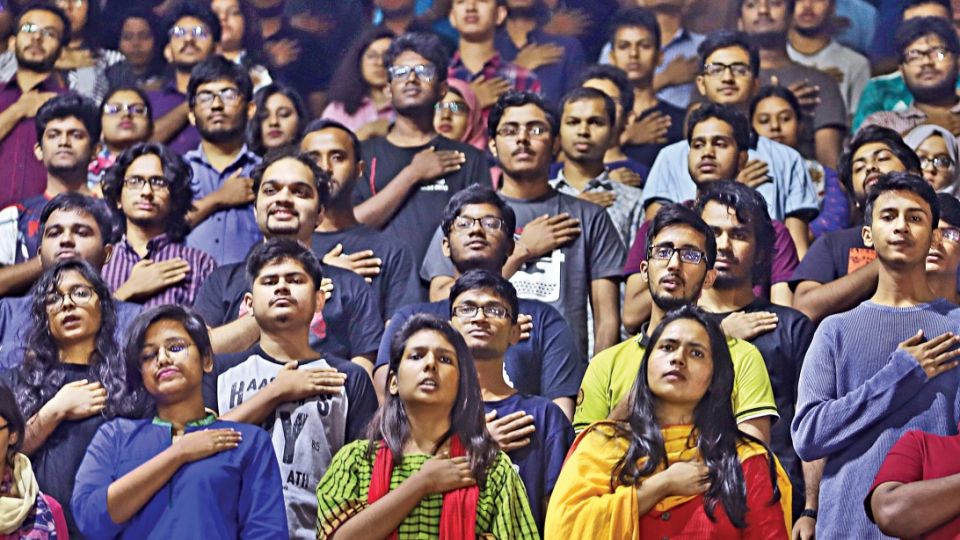October 17, 2019
Still smarting from brutal murder of Abrar, Buet students vow to resist repeat of such incidents.
With the murder of Abrar Fahad fresh in everyone’s minds, protesting students of Bangladesh University of Engineering and Technology yesterday took an oath to resist terrorism and communal forces on the campus.
“We will collectively prevent the rise of all sorts of terrorist activities and evil communal forces on the campus. Imbued with morality, we will uproot all the discriminatory cultures and abuses of power,” the students said in unison.
“Together we will make sure that no innocent life falls apart and the innocent do not fall victim to torture on this university ground.”
Several hundred students took the oath in presence of Buet vice-chancellor Prof Saiful Islam, deans of different faculties and provosts of the halls.
The programme was held at the university auditorium after being shifted from the earlier planned venue of the Shaheed Minar due to inclement weather.
As per their earlier announcement, the students did not take part in academic activities.
The vice chancellor, acting director of the directorate of Student’s Welfare (DSW) Prof Mohammed Abdul Basith and provosts of all eight halls took the oath with the students.
Prior to the oath-taking, the teachers and students observed a minute’s silence in memory of Abrar Fahad.
The students also took an oath to ensure the welfare and security of all concerned in the university, and perform their moral responsibilities with honesty and sincerity.
The students also swore to remain vocal against wrongdoings, injustices and discrimination on the campus.
Rafia Rizwana, a second-year student of the Mechanical Engineering Department, conducted the oath-taking programme around 1:00pm.
After the programme, Mahmudur Rahman Sayem, a batch-15 student of the electrical and electronic engineering department and a spokesperson for the protesters, thanked the Buet authorities and the prime minister for their sincerity in implementing the students’ demands.
They, however, said although their protest had ended, they would monitor the progress of their 10-point demand.
The demands include death sentences for the killers, identification and expulsion of the killers from the university, quick disposal of the case under a speedy tribunal, publication of a copy of the charge sheet of the case, ban on organisation-based politics in the university, explanation for the VC’s absence for 30 hours after the incident, disclosure of previous incidents of violence and establishment of a common platform to regularly review and act on complaints from students.
After the oath-taking programme, the Buet VC said the accused would be expelled after getting the report of the investigation committee.
“All the accused would be expelled. Nothing will happen on the basis of individual decisions. We will need the probe report and take a unanimous decision. There has been a lot of progress [in these regards],” the VC told reporters.
Abrar, a second-year student of Buet’s electrical and electronic engineering department, was murdered by a group of Chattra League men at the university’s Sher-e-Bangla Hall between the night of October 6 and early hours of October 7.
The Buet students had been demonstrating since the day.
The protesters relaxed their agitation on October 13 and 14 after the Buet authorities issued separate notices regarding their demands and taking the university’s admission tests into consideration.
On Tuesday, the students held a meeting with acting DSW Prof Mohammed Abdul Basith at 3:00pm at the university central cafeteria.
Later in the evening, they called off their protest, but said they would not resume academic activities until the authorities expelled the accused on the basis of the charge sheet submitted by the law enforcers.
The academic and administrative activities of Buet were supposed to resume at the end of Puja vacation on October 12, but the students are yet to start attending classes and examinations.
In the face of protests, the Buet authorities suspended 19 students whose name were mentioned in the case complaint, evicted people living illegally in the halls, sealed off rooms of political leaders and office of the student body, and installed more CCTV cameras inside all the dormitories.
‘OFFENCES IN THE NAME OF RAGGING TO BE TRIED’
Law Minister Anisul Huq yesterday assured of trying offences committed in the name of ragging at educational institutions.
“Any kind of torture, including slapping in the name of ragging, is an offence under the penal code of the country. If anybody lodges complaints of being tortured in the name of ragging, the offence will be tried under the existing laws,” he said.
The law minister’s remarks, which comes against the backdrop of the death of Buet student Abrar Fahad, was made after a meeting with a delegation of the European Union led by its Ambassador to Bangladesh Rensje Teerink at his secretariat office yesterday afternoon.
Minister Anisul said holding trial of the offences of ragging through the court was the only way to stop the practice.
He said the government would take necessary steps to hold the trial of the Abrar murder case and ensure swift justice.
“The prosecution concerned has already been asked to take preparations for moving the Abrar Fahad murder case before the court quickly as per directives from Prime Minister Sheikh Hasina. The trial proceedings of the case will begin as soon as the police submit the charge sheet of the case to the trial court,” he said.
The law minister informed that a discussion on human and labour rights took place with the EU delegation and they were ready to provide assistance to Bangladesh to this end.


